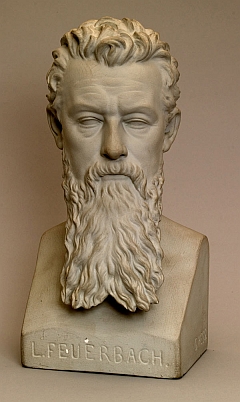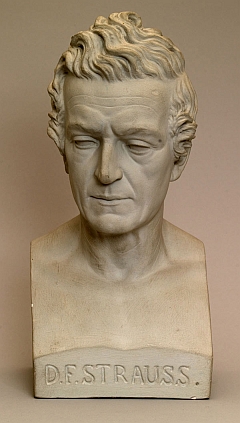Letter to Ludwig Feuerbach from Ottilie Assing
about Frederick Douglass
New York, 15 May 1871
My Dear Sir!
You may be amazed to be addressed from so great a distance by a person unknown
to you. I might not have had the courage did I not believe that any success
in your endeavors for the intellectual liberation of the human race must give
you something of the satisfaction which the Christian missionary experiences
when he, from his point of view has saved souls. I had always hoped to pay a
visit to Germany, after a long period of absence, and to meet you personally,
and although I have not abandoned this hope, so many obstacles are momentarily
in the way of fulfillment that I prefer to tell you in the form of a letter
what I had planned to talk to you about.
A number of years ago I met Frederick Douglass, a man whose name has possibly
reached you. He is a mulatto, was born a slave in the South, and gained his
freedom through flight to the North. Thanks to his exceptional talent, his skills
as a writer, and his brilliant rhetoric he worked his way out of obscurity within
a few years and became one of the most famous men in America. He was one of
the most superior among the anti-slavery agitators, and since the abolition
of slavery he excels no less by his discourse on political and social questions.
Personal sympathy and concordance in many central issues brought us together;
but there was one obstacle to a loving and lasting friendship�namely,
the personal Christian God. Early impressions, environments, and the beliefs
still dominating this entire nation held sway over Douglass. The ray of light
of German atheism had never reached him, while I, thanks to natural inclination,
training, and the whole influence of German education and literature, had overcome
the belief in God at an early age. I experienced this dualism as an unbearable
dissonance, and since I not only saw in Douglass the ability to recognize intellectual
shackles but also credited him with the courage and integrity to discard at
once the old errors and, in this one respect, his entire past, his lifelong
beliefs, I sought refuge with you. In the English translation by Mary Anne Evans
we read the Essence of Christianity together, which I, too, encountered
for the first time on that occasion. This book�for me one of the greatest manifestations
of the human spirit�resulted in a total reversal of his attitudes. Douglass
has become your enthusiastic admirer, and the result is a remarkable progress,
an expansion of his horizon, of all his attitudes as expressed especially in
his lectures and essays, which are intellectually much more rich, deep, and
logical than before. While most of his former companions in the struggle against
slavery have disappeared from the public stage since the abolition, and, in
a way, have become anachronisms because they lack fertile ideas, Douglass now
has reached the zenith of his development. For the satisfaction of seeing a
superior man won over for atheism, and through that to have gained a faithful,
valuable friend for myself, I feel obliged to you, and I cannot deny myself
the pleasure of expressing my gratitude as well as my heartfelt veneration.
Finally, I venture with typical American audacity to importune you with a request.
Would you be so kind as to grant me the pleasure of receiving a photograph of
you? I would ask you for two copies, one for me and one for Douglass. We as
atheists, who create no god to worship according to our image of ourselves,
are all the more attached in deep and ardent veneration to those human beings
in whom we recognize the representatives and translators of the highest ideas
of our age.
Your devoted
Ottilie Assing
SOURCE: Diedrich, Maria. Love
across Color Lines: Ottilie Assing and Frederick Douglass (New York:
Hill and Wang, 1999), pp. 259-260. Original German letter published in Ausgewälte
Briefe von und an Ludwig Feuerbach, ed. Hans-Martin Sass (Stuttgart: Friedrich
Frommann, 1964), vols. 12/13, pp. 365-366.
Diedrich describes the literary encounter with Feuerbach on pp. 227-230, taking
into account the history of Douglass's developing attitudes toward religion
and churches and Assing's probable exaggeration. On the German-American engagement
with Feuerbach and freethought, see pp. 113-114, 260-262, 288, also 328 for
Assing's visit to Europe. On the intellectual and literary world that Douglass
and Assing shared and Assing's fervent atheism, see pp. 190-192. On Douglass's
hostility to clerical hypocrisy, see also pp. 292-293. See also photos and captions
on pp. 225, 281, 353, 356.
See also:
Assing, Ottilie. Radical Passion: Ottilie Assing's Reports from America
and Letters to Frederick Douglass, edited, translated, and introduced by
Christoph Lohmann. New York: Peter Lang, 1999. (New Directions in German American
Studies; v. 1)

Bust
of Ludwig Feuerbach (1804-1872)
By G. Hess (1890s)
Feuerbach was a Young Hegelian philosopher,
a materialist & freethinker.
His book The Essence of Christianity
is in Mr. Douglass’ library.
Plaster. H 35.5 cm
Frederick Douglass National Historic Site, FRDO 324
|

Courtesy National Park Service, Museum Management
Program & Frederick Douglass Historic Site
Frederick Douglass Photograph Catalog Number:
FRDO 3886
19.6 x 24.5 cm Photographer: Unknown
Frederick Douglass in his library,
which housed busts of Ludwig Feuerbach
and David Friedrich Strauss,
in his home at Cedar Hill, Washington DC
Frederick Douglass National Historic Site
Overview
Virtual
museum exhibit house tour
Library
Photos
of Douglass including study
|

Bust
of David Strauss (1808-1874)
By G. Hess (1890s)
Strauss was a Hegelian philosopher,
German theologian of the higher criticism,
and the author of the Life of Jesus.
Plaster. H 34.5 cm
Frederick Douglass National Historic Site,
FRDO 325
|
Home of Frederick
Douglass, Cedar Hill, Washington, DC: Library:
Busts of David Friedrich Strauss & Ludwig Feuerbach
The
Index (A Weekly Paper), Volume 6, Whole no. 271, Thursday, March 4, 1875,
p. 1
(reports on George Hess et al)
Ludwig Feuerbach:
A Bibliography
The Young Hegelians:
Selected Bibliography
American Philosophy
Study Guide
The Afro-German
Connection: Web Guide & Bibliography
Black Studies, Music,
America vs Europe Study Guide
African American
/ Black Autodidacticism, Education, Intellectual Life (Bibliography in Progress)
Atheism / Freethought
/ Humanism / Rationalism / Skepticism / Unbelief / Secularism / Church-State
Separation Web Links
Home Page | Site
Map | What's New | Coming Attractions | Book
News
Bibliography | Mini-Bibliographies | Study
Guides | Special Sections
My Writings | Other Authors' Texts | Philosophical
Quotations
Blogs | Images
& Sounds | External Links
CONTACT Ralph Dumain
Uploaded 4 March 2002
Last update 6 April 2015
Previous update 30 March 2015
Site ©1999-2026 Ralph Dumain


